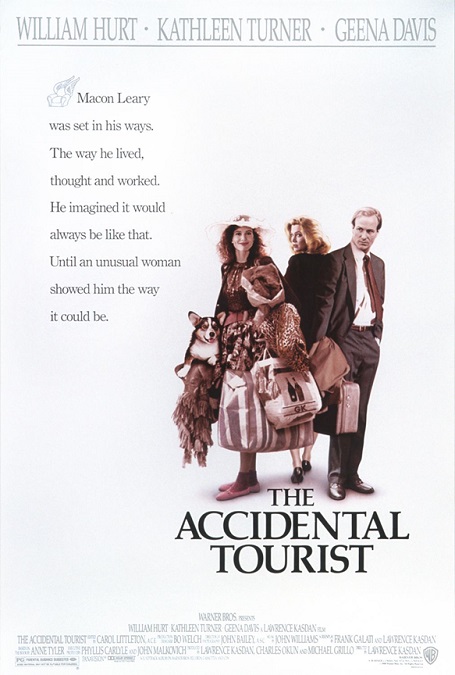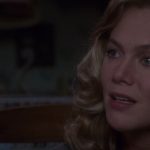
The Accidental Tourist – 1988
This movie was a strange one. It was depressing as all get out, with characters that were difficult to like or identify with. The film is listed as a comedy/drama, but I really beg to differ. There was no comedy in it at all. This was pure drama, or maybe romantic drama, though even the romance itself was heavily dramatic. The biggest thing that stood out to me was the solemn and melancholy score by legendary composer John Williams, for which he was nominated for an Oscar. It really set the tone for the entire film, ensuring that it was sad and depressing.
The biggest problem with the movie was that nearly every character is emotionally crippled. Some of them are so severely emotionally stunted that they can barely function in society. The worst of the lot is the lead character played by William Hurt, Macon Leary. He is an author who writes boring travel guides for businessmen who hate to travel. He hates his job.
He is depressed and is either disdainful or possibly terrified of most human interaction. He only feels comfortable in the presence of his wife Sarah, played by Kathleen Turner, or his three siblings, Porter, Charles, and Rose, played by David Ogden Stiers, Ed Begely Jr., and Amy Wright. He can barely tolerate his publisher Julian, played by Bill Pullman.
Within the first few minutes of the movie, two horrifying plot points are revealed. First, Macon and Sarah’s child had been murdered during an armed robbery. Second, Sarah has decided to leave Macon. She believes that he was incapable of consoling her through her grief and depression over the incident. Actually, she was right, but only because he was too lost in his own grief to help her.
Macon grows even more depressed and moves back into the house in which he grew up to be with his brothers and sister. As he must travel for his job, he has to board his dog. Geena Davis is a single woman named Muriel Pritchett, who works at the pet boarding business. When the two meet, Muriel begins to persistently pursue Macon. She helps him through his depression, despite her own troubles. She was an interesting character who always seemed to be making an effort to stay positive, despite her own troubles. Not only was she a poor, single mother, but her son was weak and allergic to nearly everything. Davis won the Academy Award for Best Supporting Actress for the roll.
Eventually Macon begins to open up to her and through her persistence, he falls in love with her. But he is so emotionally damaged that he has incredible difficulty acknowledging his feelings in any meaningful way. But Muriel eventually gets him to promise that he will not leave her. But when his sister Rose, socially crippled and emotionally timid as she is, marries the chronically lonely Julian, he runs into Sarah at the wedding. He leaves Muriel to try to patch things up with his wife. But eventually he realizes that he does not love Sarah. He loves Muriel.
Now, I don’t want it to sound like I didn’t like the movie. It was a good movie. Just don’t expect a comedy. It was deep drama, and nothing more. And as for that, the film’s biggest source of tension was not the love triangle between Sarah, Macon, and Muriel. It was Macon’s inability to get over his son’s death. Most of his real emotional problems stemmed from that. The somber film score, the depressing screenplay, and William Hurt’s deadpan and restrained performance combined to create scenes that were actually difficult to watch.
I kept thinking that Macon would have benefited from seeing a therapist, except that would have required him to endure social interaction. Still, I was reminded of the 1980 Best Picture winner, Ordinary People, in which Judd Hirsch played a psychologist who helped Timothy Hutton get over the death of his brother in a powerful and cathartic therapy session. I wanted to see Macon have a catharsis.
But in the end, his healing only began when he realized that he wanted to be with Muriel because she had been the one to help him through his own pain. It was a subtle change, but I recognized the significance of the movie’s final shot. As Macon is riding away in a cab, he sees Muriel trying to hail a taxi. He tells his driver to stop for her. When their eyes meet, she smiles at him. He smiles back, and it is the only time in the entire film where we see Macon happily smile.








